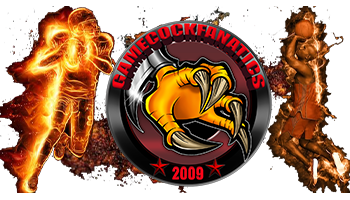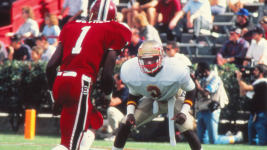Remember when Deion Sanders played at Williams-Brice? He had plenty to brag about
January 25, 2019
THE STATE
Next season, Shilo Sanders will take the field at Williams-Brice Stadium. He’ll be the first member of his family to don garnet and black, but not the first to play there.
Shilo Sanders, who committed to USC on Tuesday and will sign Feb. 6, is a strong football prospect in his own right, but he’ll usually get introduced in some way or another as Deion’s son. His father was a legend at Florida State, and a part of that was built against the Gamecocks.
Deion Sanders’ teams faced USC three times, twice in Columbia. The third and final meeting came at a turning point moment for the USC program and the start of a moment for FSU.
Deion Sanders’ teams took games in 1985 and 1986 by scores of 56-14 and 45-28. Neither South Carolina team was above .500. Both Seminoles teams were good, but not yet great, and one of the more notable parts was that the three-win 1986 Gamecocks scored the third-most of any FSU opponent that season.
But in 1988, South Carolina had a better team. So did FSU.
The Gamecocks were ranked No. 15, sitting at 7-1. They were on a 15-5 run after eight total wins in the two years following the famed 10-2 campaign in 1984. FSU was No. 5 in the country, having won seven in a row after losing its opener to Miami.
It also came less than two weeks after Sports Illustrated published a story from a former Gamecocks player alleging steroid use within the program.
Even before the game on Nov. 5, 1988, Gamecocks quarterback Todd Ellis knew what to expect from Deion Sanders.
“He was great on film,” Ellis said. “Nobody was going his way. I didn’t have much desire to go his way at all. What I remember was he was so good that on film, he would lure quarterback into throwing his way. They thought that they had enough cushion, enough space, and then he would break on the football.”
Then the game started, and things went very sideways for South Carolina.
The Gamecocks’ first six drives included three interceptions, one lost fumble and a blocked punt that was returned for a score. The FSU defense that was one of the first built on pure speed at nearly every spot and was in fine form that night.
“Saturday night was an extreme case of how poorly the Gamecocks are capable of playing,” a story from The State said after the game. “While the Seminoles put in a near flawless performance, showing why they’re one of the nation’s top-ranked teams, USC helped them with miscues all night long.”
It was 31-0 at halftime and 59-0 when the final whistle blew. In the first half, Ellis only challenged Sanders once, and he closed a large cushion quickly enough to break up a pass. USC finished with 79 passing yards on nine completions in 23 attempts.
Sanders went unmentioned in several stories that recapped the game, but Ellis insisted that wasn’t reflective of his role.
“He made some plays,” Ellis said. “I know that.
“Anybody there that night watching it, or watching it on film, knew his impact on the game.”
Longtime Charleston Post and Courier columnist Gene Sapakoff tweeted out a memory from the game, with Sanders talking to fans in the front row and saying, “You people should ask for your money back.”
Ellis didn’t remember that specific moment, but he did confirm Deion Sanders, as usual, wasn’t quiet.
“He certainly was talking during the game,” Ellis said. “That certainly wasn’t unusual for him or anyone else.
“They had a lot of things to be confident about after that game.”
The scene at the end was described in a story from The State, breaking down the broadcast.
“As the ESPN cameras panned an emptying Williams-Brice Stadium in the third quarter, (Bob) Carpenter noted how excited the fans had been at the outset during the playing of 2001.
Quipped (Kevin ) Kiley, ‘That’s all that’s left of the crowd of 75,000 now, two thousand and one.’ ”
The game was played during a turning point for South Carolina’s program.
The Gamecocks knocked off Navy a week later, fell to No. 15 Clemson and dropped a bowl game to Indiana. Three months later to the day of the FSU game, head coach Joe Morrison died of a heart attack.
After back-to-back 8-4 seasons under Morrison, the Gamecocks wouldn’t reach that benchmark again until Lou Holtz was at the helm in 2000.
Florida State finished that season at 11-1, No. 3 in the AP poll. The Seminoles went on to win 10 or more games through 2000, finishing in the top-5 each season.
This season, Deion Sanders will likely be in Columbia at some point. He’ll be in the stands he once helped empty, watching another Sanders set out to make his own story.
January 25, 2019
THE STATE
Next season, Shilo Sanders will take the field at Williams-Brice Stadium. He’ll be the first member of his family to don garnet and black, but not the first to play there.
Shilo Sanders, who committed to USC on Tuesday and will sign Feb. 6, is a strong football prospect in his own right, but he’ll usually get introduced in some way or another as Deion’s son. His father was a legend at Florida State, and a part of that was built against the Gamecocks.
Deion Sanders’ teams faced USC three times, twice in Columbia. The third and final meeting came at a turning point moment for the USC program and the start of a moment for FSU.
Deion Sanders’ teams took games in 1985 and 1986 by scores of 56-14 and 45-28. Neither South Carolina team was above .500. Both Seminoles teams were good, but not yet great, and one of the more notable parts was that the three-win 1986 Gamecocks scored the third-most of any FSU opponent that season.
But in 1988, South Carolina had a better team. So did FSU.
The Gamecocks were ranked No. 15, sitting at 7-1. They were on a 15-5 run after eight total wins in the two years following the famed 10-2 campaign in 1984. FSU was No. 5 in the country, having won seven in a row after losing its opener to Miami.
It also came less than two weeks after Sports Illustrated published a story from a former Gamecocks player alleging steroid use within the program.
Even before the game on Nov. 5, 1988, Gamecocks quarterback Todd Ellis knew what to expect from Deion Sanders.
“He was great on film,” Ellis said. “Nobody was going his way. I didn’t have much desire to go his way at all. What I remember was he was so good that on film, he would lure quarterback into throwing his way. They thought that they had enough cushion, enough space, and then he would break on the football.”
Then the game started, and things went very sideways for South Carolina.
The Gamecocks’ first six drives included three interceptions, one lost fumble and a blocked punt that was returned for a score. The FSU defense that was one of the first built on pure speed at nearly every spot and was in fine form that night.
“Saturday night was an extreme case of how poorly the Gamecocks are capable of playing,” a story from The State said after the game. “While the Seminoles put in a near flawless performance, showing why they’re one of the nation’s top-ranked teams, USC helped them with miscues all night long.”
It was 31-0 at halftime and 59-0 when the final whistle blew. In the first half, Ellis only challenged Sanders once, and he closed a large cushion quickly enough to break up a pass. USC finished with 79 passing yards on nine completions in 23 attempts.
Sanders went unmentioned in several stories that recapped the game, but Ellis insisted that wasn’t reflective of his role.
“He made some plays,” Ellis said. “I know that.
“Anybody there that night watching it, or watching it on film, knew his impact on the game.”
Longtime Charleston Post and Courier columnist Gene Sapakoff tweeted out a memory from the game, with Sanders talking to fans in the front row and saying, “You people should ask for your money back.”
Ellis didn’t remember that specific moment, but he did confirm Deion Sanders, as usual, wasn’t quiet.
“He certainly was talking during the game,” Ellis said. “That certainly wasn’t unusual for him or anyone else.
“They had a lot of things to be confident about after that game.”
The scene at the end was described in a story from The State, breaking down the broadcast.
“As the ESPN cameras panned an emptying Williams-Brice Stadium in the third quarter, (Bob) Carpenter noted how excited the fans had been at the outset during the playing of 2001.
Quipped (Kevin ) Kiley, ‘That’s all that’s left of the crowd of 75,000 now, two thousand and one.’ ”
The game was played during a turning point for South Carolina’s program.
The Gamecocks knocked off Navy a week later, fell to No. 15 Clemson and dropped a bowl game to Indiana. Three months later to the day of the FSU game, head coach Joe Morrison died of a heart attack.
After back-to-back 8-4 seasons under Morrison, the Gamecocks wouldn’t reach that benchmark again until Lou Holtz was at the helm in 2000.
Florida State finished that season at 11-1, No. 3 in the AP poll. The Seminoles went on to win 10 or more games through 2000, finishing in the top-5 each season.
This season, Deion Sanders will likely be in Columbia at some point. He’ll be in the stands he once helped empty, watching another Sanders set out to make his own story.
Last edited by a moderator:


